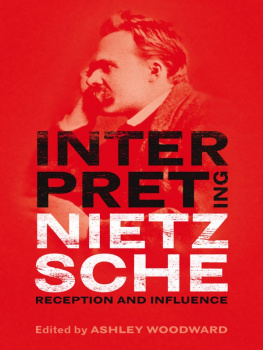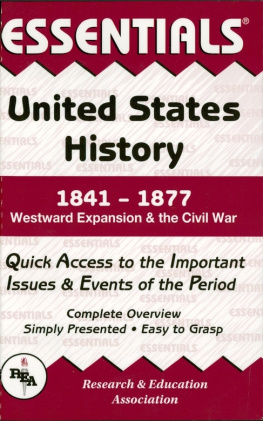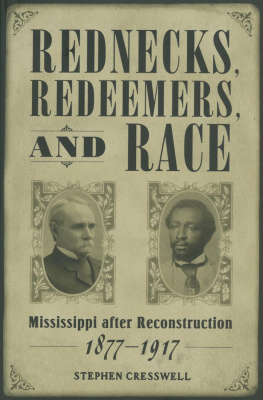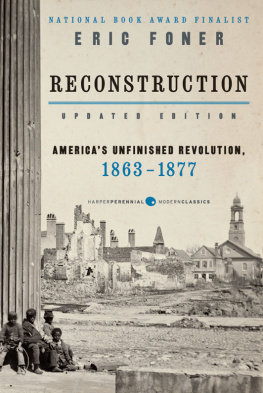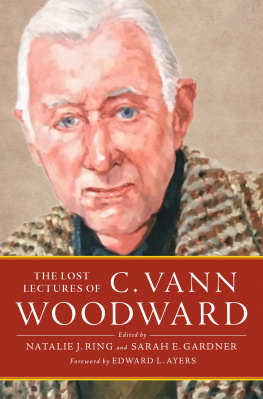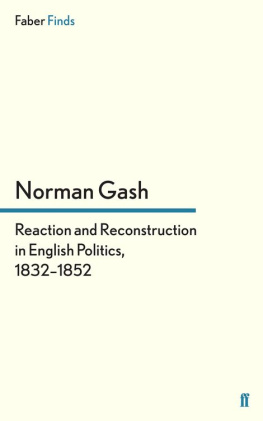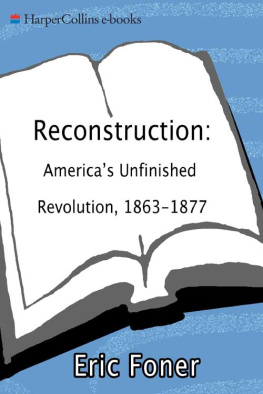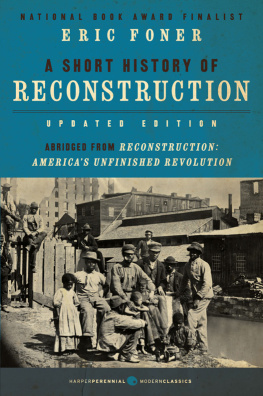Woodward - Reunion and reaction: the compromise of 1877 and the end of Reconstruction
Here you can read online Woodward - Reunion and reaction: the compromise of 1877 and the end of Reconstruction full text of the book (entire story) in english for free. Download pdf and epub, get meaning, cover and reviews about this ebook. City: New York;Estats Units dAmèrica;Oxford, year: 1991;1966, publisher: Oxford University Press, genre: Politics. Description of the work, (preface) as well as reviews are available. Best literature library LitArk.com created for fans of good reading and offers a wide selection of genres:
Romance novel
Science fiction
Adventure
Detective
Science
History
Home and family
Prose
Art
Politics
Computer
Non-fiction
Religion
Business
Children
Humor
Choose a favorite category and find really read worthwhile books. Enjoy immersion in the world of imagination, feel the emotions of the characters or learn something new for yourself, make an fascinating discovery.

- Book:Reunion and reaction: the compromise of 1877 and the end of Reconstruction
- Author:
- Publisher:Oxford University Press
- Genre:
- Year:1991;1966
- City:New York;Estats Units dAmèrica;Oxford
- Rating:3 / 5
- Favourites:Add to favourites
- Your mark:
- 60
- 1
- 2
- 3
- 4
- 5
Reunion and reaction: the compromise of 1877 and the end of Reconstruction: summary, description and annotation
We offer to read an annotation, description, summary or preface (depends on what the author of the book "Reunion and reaction: the compromise of 1877 and the end of Reconstruction" wrote himself). If you haven't found the necessary information about the book — write in the comments, we will try to find it.
Reunion and reaction: the compromise of 1877 and the end of Reconstruction — read online for free the complete book (whole text) full work
Below is the text of the book, divided by pages. System saving the place of the last page read, allows you to conveniently read the book "Reunion and reaction: the compromise of 1877 and the end of Reconstruction" online for free, without having to search again every time where you left off. Put a bookmark, and you can go to the page where you finished reading at any time.
Font size:
Interval:
Bookmark:
Books by C. Vann Woodward
TOM WATSON: AGRARIAN REBEL
THE BATTLE FOR LEYTE GULF
ORIGINS OF THE NEW SOUTH
THE STRANGE CAREER OF JIM CROW
THE BURDEN OF SOUTHERN HISTORY
REUNION AND REACTION
Editor
George Fitzhugh, CANNIBALS ALL
Lewis H. Blair, A SOUTHERN PROPHECY
Whitelaw Reid, AFTER THE WAR
Coauthor
THE NATIONAL EXPERIENCE
REUNION AND REACTION
The Compromise of 1877 and the End of Reconstruction
by
C. VANN WOODWARD

Oxford University Press
Oxford New York Toronto
Delhi Bombay Calcutta Madras Karachi
Petaling Jaya Singapore Hong Kong Tokyo
Nairobi Dar es Salaam Cape Town
Melbourne Auckland
and associated companies in
Berlin Ibadan
Copyright 1966 by C. Vann Woodward
First published in 1951 by Little, Brown and Company, Boston
First issued as an Oxford University Press paperback, 1991
Oxford is a registered trademark of Oxford University Press
All rights reserved. No part of this publication may be reproduced,
stored in a retrieval system, or transmitted, in any form or by any means,
electronic, mechanical, photocopying, recording, or otherwise,
without the prior permission of Oxford University Press, Inc.
Library of Congress Cataloging-in-Publication Data
Woodward, C. Vann (Comer Vann), 1908
Reunion and reaction / C. Vann Woodward.
p. cm.
Reprint, with new pref. Originally published: Boston : Little,
Brown, 1966.
Includes bibliographical references and index.
ISBN 0-19-506423-2 (paper)
1. United States Politics and government18771881.
2. Reconstruction. I. Title.
E681.W83 1991
973-8.3dc20 90-7751 CIP
2 4 6 8 10 9 7 5 3 1
Printed in the United States of America
FOR GLENN
The American community of scholars is justly noted for its generosity with time and learning. I have partaken freely of both at the hands of historians, colleagues, editors, and friends in the preparation of this book. My debt to them is a large one. I hope that my obligation to their published works is adequately acknowledged in footnotes. In looking back over the citations, however, I was struck by the omission of one name that of the late Charles A. Beard. It was, perhaps, an unconscious tribute that it did not seem necessary to mention him as the originator of the concept of the Civil War and Reconstruction as a revolution the Second American Revolution, as he and Mary R. Beard called it. Yet my book is built upon that conception. I merely attempt to add a description of the final phase of the revolution, the phase that the French speak of as Thermidor in writing of their great revolution. I wish to acknowledge this debt to Beard and at the same time to express the hope that American historians will never permit honest differences of opinion over foreign policy to withhold from the late dean of the craft the honor that is justly due him.
My research was greatly assisted by several librarians and their staffs. Among these are first of all Miss Margaret Lough and Miss Beatrice Blakslee of the Johns Hopkins University History Library. I am also greatly indebted to Mr. Watt P. Marchman of the Hayes Memorial Library, Fremont, Ohio, as well as to his predecessor in that office, Mr. Curtis P. Garrison. I wish also to thank for their many courtesies the staffs of the Library of Congress, particularly its Division of Manuscripts, the Enoch Pratt Free Library of Baltimore, the New York Public Library, the John Crerar Library and the Newberry Library of Chicago, the Libraries of the University of Chicago, the Library of the Bureau of Railway Economics in Washington, the Indiana Historical Society of Indianapolis, the Iowa State Archives of Des Moines, the Mississippi State Department of Archives and History at Jackson, and the University of North Carolina Library at Chapel Hill.
Without involving any of them in responsibility for my views or my errors, I wish to thank those who have been kind enough to read the entire manuscript and offer valuable suggestions. These are Professors Howard K. Beale of the University of Wisconsin, Charles A. Barker of the Johns Hopkins University, and Manning J. Dauer and William G. Carleton of the University of Florida.
C. V. W.
The present edition of this book is a revival of the original edition published in 1951. In 1956 a revised and slightly abridged version appeared which eliminated the footnotes and added an introduction and a final chapter entitled The Continuous Past. I have two reasons for dropping the revisions and returning to the original text. In the first place, I think there is value in placing the full documentation, vital clues in an elaborate piece of detective work, before the reader. And secondly, the added materials in the introduction and final chapter now appear dated. These afterthoughts for the revised edition were written before it was clear that the Compromise of 1877 had really been breached. It was a time when the Southern resistance to the Second Reconstruction was firm and determined, sustained by an alliance between Northern and Southern conservatives of the sort who had written off the idealistic aims of the First Reconstruction, abandoned national responsibility for civil rights, and turned the control of the Negroes over to the South. My emphasis was therefore upon continuity the continuous past with a suggestion of danger that the past might be repeated. That continuity is now broken and the danger seems no longer a threat. In the decade since 1956 what remained of the Compromise of 1877 has gone completely to pieces under smashing blows of federal action. These blows included armed intervention under Presidential order, congressional enactments to protect civil and political rights, and judicial decisions upholding these actions. By 1965 nothing was left in word or spirit of the old sectional accommodation that had not been breached and broken. It had gone the way of the historic compromises that preceded it. It had, however, far outlasted them all. Anyone who seeks an understanding of the century of frustration for civil rights between the First Reconstruction and the Second will still have to understand the Compromise of 1877.
C.V.W.
A book that has survived for forty years requires a preface in a new edition for at least two reasons: to acknowledge new historical events bearing on its subject, and to call attention to new criticism of its thesis and its scholarship. In the 1967 edition I pointed out that the Compromise of 1877, the longest in American history, had at last been broken when President Eisenhower sent troops into Little Rock, in 1957, to defend black students. As for criticism, there had really been none of significance by the time of the previous edition. In fact, for the first twenty years and more the book seemed to lead a charmed existence. It was greeted on first appearance in 1951 with generous attention and praise by reviewers, three of whom professed to find in it the appeal of a detective story.
Serious criticism did not begin until 1973, but it then continued into the 1980s. I have already summarized the criticism and responded to it at greater length in Thinking Back: The Perils of Writing History (1986). But rather than send the reader to another book, and in spite of the repetition involved, it is my feeling that a new edition of Reunion and Reaction
Next pageFont size:
Interval:
Bookmark:
Similar books «Reunion and reaction: the compromise of 1877 and the end of Reconstruction»
Look at similar books to Reunion and reaction: the compromise of 1877 and the end of Reconstruction. We have selected literature similar in name and meaning in the hope of providing readers with more options to find new, interesting, not yet read works.
Discussion, reviews of the book Reunion and reaction: the compromise of 1877 and the end of Reconstruction and just readers' own opinions. Leave your comments, write what you think about the work, its meaning or the main characters. Specify what exactly you liked and what you didn't like, and why you think so.



